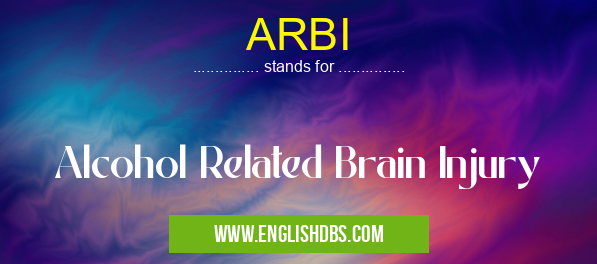What does ARBI mean in MEDICAL
Alcohol Related Brain Injury (ARBI) is a serious condition that can result from long-term alcohol abuse. This can be an acquired brain injury caused by the toxic chemicals found in alcoholic beverages, as well as related bone and tissue damage. The effects of ARBI can vary widely, affecting different parts of the brain and body. These impairments can cause cognitive, physical, and behavioral problems that have a significant impact on everyday life. It is important to understand how ARBI affects individuals so that proper diagnosis and treatment can be provided early on in order to maximize recovery potential.

ARBI meaning in Medical in Medical
ARBI mostly used in an acronym Medical in Category Medical that means Alcohol Related Brain Injury
Shorthand: ARBI,
Full Form: Alcohol Related Brain Injury
For more information of "Alcohol Related Brain Injury", see the section below.
What is ARBI?
Alcohol-related Brain Injury (ARBI) is caused by excessive consumption of alcohol over a long period of time. It occurs when the individual's brain cells become damaged due to either direct or indirect exposure to toxic chemicals associated with alcohol use, trauma from falls or other accidents related to alcohol use, thiamine deficiency from poor nutrition combined with heavy drinking, interference with blood flow throughout the brain due to high blood alcohol concentration levels for extended periods of time, or withdrawal symptoms caused by sudden cessation of drinking after long-term alcoholism has been established. These conditions lead to impaired cognitive functioning including memory deficits, difficulty concentrating or staying focused, impaired judgement and reasoning abilities, disorientation and confusion. Physical effects include various types of sensory impairments such as vision changes, loss of coordination and balance control leading to possible falls or difficulty walking which may necessitate the need for assistive devices such as wheelchairs or walkers in order to remain independent with daily activities. Additionally there may be seizures due to unhealthy electrical activity in the brain as well as motor impairments resulting in unilateral weakness especially on one side of the body due to greater damage on one area causing paralysis like symptoms such as inability move legs or arms etc
Essential Questions and Answers on Alcohol Related Brain Injury in "MEDICAL»MEDICAL"
What is an ARBI?
Alcohol-related brain injury (ARBI) is a condition where a person has sustained lasting physical, emotional, and/or cognitive damage as a result of alcohol use. This type of brain injury can occur with any level of alcohol consumption, but it is especially likely to happen with heavy and repeated drinking.
How does ARBI differ from more general substance abuse?
While both ARBI and more general substance abuse are frequently linked to chronic alcohol consumption, ARBI is not just about the direct effects of excessive alcohol consumption on the body. It's about specific types of damage that occur in the brain due to the long-term effects of alcohol consumption.
What are the signs and symptoms of ARBI?
Symptoms associated with ARBI vary greatly depending on the amount of damage that has been done to the brain. Some common symptoms include impaired memory or thinking skills, changes in behavior, difficulty concentrating, loss of coordination, confusion or disorientation, depression or anxiety, irritability or mood swings.
Can people recover from ARBI?
Yes, it's possible for some patients to experience improvement over time if they abstain from further alcohol use and receive proper care and treatment. Depending on the level of damage that has been done to their brains as a result of their drinking habits, full recovery may not always be possible — but many patients have reported improved quality of life with proper treatment.
Is there any way to prevent ARBI?
The most effective way to reduce your risk for developing ARBI is by abstaining from alcohol altogether or moderating your consumption so that you do not exceed medically recommended guidelines for safe levels of use. Additionally, those who choose to drink should ensure that they do so responsibly and avoid activities such as driving while under the influence or engaging in hazardous behaviors when intoxicated.
Final Words:
In conclusion, Alcohol Related Brain Injury (ARBI) is a serious condition that requires prompt medical attention and intervention in order for recovery prognosis to be maximized. Proper diagnosis requires comprehensive evaluation including physical assessment through laboratory tests as well as neuropsychological testing which will provide objectively measured data about functional decline associated with ARBI and guide subsequent treatment recommendations. With proper diagnosis and timely intervention individuals affected by ARBI can receive assistance with regaining their mental health stability as well as increase their physical mobility and quality of life.
